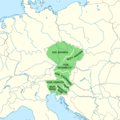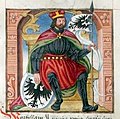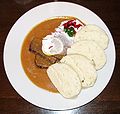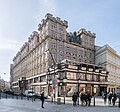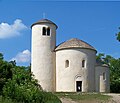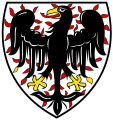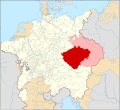Portal:Czech Republic
Welcome to the Czech Portal!
Vítejte na Českém portálu!

|

|

| |
The Czech Republic, also known as Czechia, and historically known as Bohemia, is a landlocked country in Central Europe. The country is bordered by Austria to the south, Germany to the west, Poland to the northeast, and Slovakia to the southeast. The Czech Republic has a hilly landscape that covers an area of 78,871 square kilometers (30,452 sq mi) with a mostly temperate continental and oceanic climate. The capital and largest city is Prague; other major cities and urban areas include Brno, Ostrava, Plzeň and Liberec.
The Duchy of Bohemia was founded in the late 9th century under Great Moravia. It was formally recognized as an Imperial Estate of the Holy Roman Empire in 1002 and became a kingdom in 1198. Following the Battle of Mohács in 1526, all of the Lands of the Bohemian Crown were gradually integrated into the Habsburg monarchy. Nearly a hundred years later, the Protestant Bohemian Revolt led to the Thirty Years' War. After the Battle of White Mountain, the Habsburgs consolidated their rule. With the dissolution of the Holy Roman Empire in 1806, the Crown lands became part of the Austrian Empire.
In the 19th century, the Czech lands became more industrialized; further, in 1918, most of the country became part of the First Czechoslovak Republic following the collapse of Austria-Hungary after World War I. Czechoslovakia was the only country in Central and Eastern Europe to remain a parliamentary democracy during the entirety of the interwar period. After the Munich Agreement in 1938, Nazi Germany systematically took control over the Czech lands. Czechoslovakia was restored in 1945 and three years later became an Eastern Bloc communist state following a coup d'état in 1948. Attempts to liberalize the government and economy were suppressed by a Soviet-led invasion of the country during the Prague Spring in 1968. In November 1989, the Velvet Revolution ended communist rule in the country and restored democracy. On 31 December 1992, Czechoslovakia was peacefully dissolved, with its constituent states becoming the independent states of the Czech Republic and Slovakia.
The Czech Republic is a unitary parliamentary republic and developed country with an advanced, high-income social market economy. It is a welfare state with a European social model, universal health care and free-tuition university education. It ranks 32nd in the Human Development Index. The Czech Republic is a member of the United Nations, NATO, the European Union, the OECD, the OSCE, the Council of Europe and the Visegrád Group. (Full article...)
Selected article -
The Slavs or Slavic people are groups of people who speak Slavic languages. Slavs are geographically distributed throughout the northern parts of Eurasia; they predominantly inhabit Central Europe, Eastern Europe, Southeastern Europe, and Northern Asia, though there is a large Slavic minority scattered across the Baltic states and Central Asia, and a substantial Slavic diaspora in the Americas, Western Europe, and Northern Europe.
Early Slavs lived during the Migration Period and the Early Middle Ages (approximately from the 5th to the 10th century AD), and came to control large parts of Central, Eastern, and Southeast Europe between the sixth and seventh centuries. Beginning in the 7th century, they were gradually Christianized. By the 12th century, they formed the core population of a number of medieval Christian states: East Slavs in the Kievan Rus', South Slavs in the Bulgarian Empire, the Principality of Serbia, the Duchy of Croatia and the Banate of Bosnia, and West Slavs in the Principality of Nitra, Great Moravia, the Duchy of Bohemia, and the Kingdom of Poland. (Full article...)
Selected picture
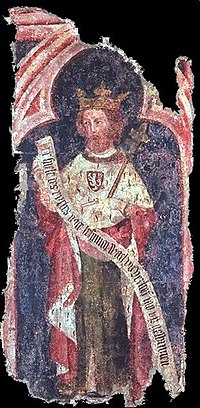
Source: www.bildindex.de; License: Public domain
In this month
- 14 November 1960 – The deadliest rail disaster in Czech history takes place in Eastern Bohemia, resulting in 118 deaths
- 14 November 1918 – Tomáš Garrigue Masaryk (pictured) becomes the first President of Czechoslovakia
- 17 November 1939 – Nazi Germany storms Czech universities, executing nine students and professors, later commemorated as International Students' Day
- 17 November 1989 – The Velvet Revolution starts in Prague, culminating in the end of 41 years of Communist rule in Czechoslovakia
- 24 November 1966 – The deadliest air disaster in Czechoslovakia takes place near Bratislava, killing all 82 on board
Categories
Selected biography -
Jaromír Jágr (Czech pronunciation: [ˈjaromiːr ˈjaːɡr̩] ; born 15 February 1972) is a Czech professional ice hockey right winger and owner of Rytíři Kladno of the Czech Extraliga (ELH). He previously played in the National Hockey League (NHL) for the Pittsburgh Penguins, Washington Capitals, New York Rangers, Philadelphia Flyers, Dallas Stars, Boston Bruins, New Jersey Devils, Florida Panthers and Calgary Flames, serving as captain of the Penguins and the Rangers, between 1990 and 2008.
After leaving the Rangers in 2008, he played three seasons in the Kontinental Hockey League (KHL) with Avangard Omsk. He returned to the NHL in 2011 with the Flyers and remained in the league for seven more years before being assigned by the Flames in 2018 to HC Kladno. Having played in 37 professional seasons (as of 2024) and over 2,000 professional games, Jágr has had the longest playing career in professional ice hockey history. He is the most productive European player who has ever played in the NHL and is widely regarded as one of the greatest players ever. (Full article...)
Did you know?

- ...that, although Mozart never visited Kroměříž, much of the Academy Award-winning film Amadeus was filmed at the local episcopal residence?
- ... that the leftist Czechoslovak Chemical Workers' Union was expelled from the OSČ trade union centre in 1922?
- ... that, having played 465 league matches, Jaroslav Šilhavý holds the record for the most appearances in top-flight Czech football?
- ... that Josef Jiří Kolár was the first to begin a systematic translation of Shakespeare's plays into Czech?
General images
Related portals
Topics

Czech lands: Bohemia • Moravia • Czech Silesia
History: Únětice culture • Boii • Marcomanni • Samo • Great Moravia • Přemyslid dynasty • Lands of the Bohemian Crown • Czech lands (1526–1648) • 1648–1867 • 1867–1918) • Czechoslovakia • Czech Republic
Geography: Lakes • Protected areas • Regions • Rivers
Law: Judiciary • Law enforcement • Supreme Court of the Czech Republic
Politics: Administrative divisions • Government • Constitution • Elections • Foreign relations • Army • Parliament • Political parties • President • Prime Minister
Economy: Banks • Czech koruna • Energy • Oil and gas deposits • Stock Exchange • Tourism • Transport
Culture: Architecture • Art • Cinema • Cuisine • Demographics • Education • Language • Literature • Media • Music • Philosophy • Prostitution • Public holidays • Religion • Sport • Television • Video games
Symbols: Flag • Coat of arms • National anthem (Kde domov můj)
Lists: Outline of the Czech Republic • List of Czech Republic–related topics
WikiProjects
Featured and good content
Things to do
Wikimedia
The following Wikimedia Foundation sister projects provide more on this subject:
-
Commons
Free media repository -
Wikibooks
Free textbooks and manuals -
Wikidata
Free knowledge base -
Wikinews
Free-content news -
Wikiquote
Collection of quotations -
Wikisource
Free-content library -
Wikiversity
Free learning tools -
Wikivoyage
Free travel guide -
Wiktionary
Dictionary and thesaurus












